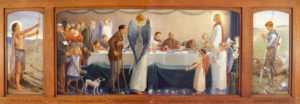This blog post is the second in a two-part series adapted from a piece originally published on Scot’s personal blog (link below). For part one, visit http://www.brethrenlifeandthought.org/2017/04/21/on-hospitality-banquet-of-the-absurd-luke-1412-24-pt-i-guest-blogger-scot-miller/. What follows is a continuation of Scot’s story about serving the water distribution effort last year in Flint, Michigan.
Over the next few weeks, we distributed water, fed children of all ages, homeless persons, and drug addicts, treated a heroin overdose, and began delivering food to folks who were marginalized to the point of being afraid of coming to the church (some distribution points were asking for photo identification). I was able to do outreach and wellness checks to families who made their only income illegally, thus preventing them from seeking some services for fear of opening excuses for home visits from authorities. We served refugees and immigrants who did not know English, and could not get help, or were scared to seek it out. The Church of the Brethren building on Stocker Avenue was a church, and it was contributing to its neighbor’s lives in many ways. The building was truly a place of welcoming and affirmation of all folks from any and every background. We were the church. We were practicing radical hospitality.
We continued to talk about the Bible and what the stories of the Bible meant to us. We also talked regularly about how the church might be relevant in the lives of our neighbors. I also believe we wanted the church to be more relevant to us spiritually. Sometimes, our church experiences left us longing. Sometimes, we felt spiritually malnourished. Mary Lorah-Hammond and Jennifer Betts had been dreaming of doing dinner church, and they also knew that the water crisis brought new nutrition needs to the forefront of everyone’s mind. It was decided that we extend our hospitality to folks at the farm market and our Facebook friends, activist, and professionals who were serving the city to share dinners on Tuesday nights. Flyers were made and distributed, invitations were extended, and preparations were made for a messianic banquet we called “Feeding of the Flintstones.”
And nobody came.
But we had been reading the text.
The text had answers.
While Mary and Jennifer cooked, I went outside and walked around the neighborhood, inviting every individual or family I came across to come to the church on Stocker Avenue and share a meal. I believe we had 12 that first evening, certainly a number appropriate to our shared narrative. This continued every Tuesday night. Some folks followed up on the invite. More often than not, all of our guests came as the result of someone going out into the neighborhood who embodied the text of Luke 14, which invites all and sundry to experience fellowship without regard to status or ability to contribute to the “potluck” that is a staple of Midwestern hospitality for “those who belong.”
One warm evening, my son Micah and I left Mary and Jennifer to cooking and walked around the west side neighborhood looking for folks to invite for meal sharing. As we walked down Arlene Avenue, I noticed two women in a van parked on the corner of Mann Avenue. I approached the van to invite them to dinner and saw they were both crying. I asked if I could help, and they indicated to Micah and me that one of the women’s family had just moved into an abandoned house, and they had lost their food benefits card, had no cash, nothing to eat, and no electricity. I told them to bring everyone to the church for a meal.
That Tuesday evening, we had more than 20 folks eating with us, eight of them belonging to the woman sitting in the car. As everyone was enjoying food and conversation, Mary and Jennifer were talking with the women; I tried to reach out to the father of the group. He was less than interested in communicating and seemed to feel patronized by me as I served him bread and soup. He was not enjoying my presence, or anyone else’s.
As Now Ministries worked to get the whole family set up for food delivery the next day, it was evident they needed some things that night. I asked the father if he would like to go with me to Kroger to pick some things up, and I could foot the bill. Reluctantly, he made the decision to go. As we drove by ourselves to the grocery store, he began to open up just a bit. When he found out that we shared some experiences of city living, we were able to begin a conversation that, within 15 minutes, turned into a warm experience of friendship.
The fact of our hospitality was the result of reading the text and then trusting that our living out the stories would lend credibility to our actions. In fact, we acted in faith, and our faith was vindicated. But the vindication is by no means represented in a growth of church membership, or big publicity regarding our worship services, or even in miracle funding for more outreach. For the text states that it is of no use to provide hospitality to those who somehow repay you or invite you in return, but rather we are to invite and serve the poor. We will be vindicated for our faithfulness at the Judgment, but salvation comes immediately to those in need. They are liberated from the bondage of facing the crisis in isolation. Everyone knows that sin is evident, but the opportunity to respond in new ways with new outcomes is what the church is to reveal to those in need. The apocalypse is the unveiling of how the church responds to sin that has not been properly identified as sin. If the economics of food are unjust, the church calls this sin and offers an alternative.
In fact, we are sharing or extending the blessings of faith in a manner that makes the kingdom of God a credible alternative to systematic corporate sin for those most in need of God’s grace and mercy. It is our voluntary sacrifice of privilege and our sharing of resources that makes our claims of the Kingdom of God credible. We embody faith at our expense, and not for reward. This is faithfulness. This is apocalyptic witness. This is the eschatological “end-times” that marks not the end of the world, but more importantly, the end of an age that witnesses the collusion of the so-called Church and State to promote wealth and power rather than the victory of the Lamb over the devil, sin, and death.
An apocalyptic unveiling is not God’s new response to sin, but the church’s identifying and uncovering the fact of corporate sin which has been sold to Christians as conservative religion. Civic Christendom is far from conservative. Rather, it is liberal democracy costumed as Christianity in order to the hide selfishness, racism, and exclusivity that has victimized those who need the church the most. The church has not only colluded with the State, but indeed has colluded with the Accuser. We accuse those left behind as being responsible for the products of our own economic, racial, and militant sin. This heresy is a Satanic reversal of the Gospel call to love one another as ourselves.
The folks of Flint have been left behind, but they have not been left behind to suffer through some apocalyptic Armageddon. They have simply been left behind as “the least of these.” Flint and other places like it have been left behind by Christians who keep promising that heaven awaits them, preaching that if the victims of sin don’t clean their act up, God will leave them behind just as the economy, the judiciary, and education has left them behind.
Indeed, if these so-called spiritual warriors read Revelation more closely, they might see passed the plank in their eyes to see that Christ judges them. The biggest sin of Christendom is the Laodicean error – the error that Jesus would not overlook.
Revelation 3:15-20 (HCSB)
15 I know your works, that you are neither cold nor hot. I wish that you were cold or hot. 16 So, because you are lukewarm, and neither hot nor cold, I am going to vomit you out of My mouth. 17 Because you say, ‘I’m rich; I have become wealthy and need nothing,’ and you don’t know that you are wretched, pitiful, poor, blind, and naked, 18 I advise you to buy from Me gold refined in the fire so that you may be rich, white clothes so that you may be dressed and your shameful nakedness not be exposed, and ointment to spread on your eyes so that you may see.19 As many as I love, I rebuke and discipline. So be committed and repent. 20 Listen! I stand at the door and knock. If anyone hears My voice and opens the door, I will come in to him and have dinner with him, and he with Me.
 Scot Miller, of Hastings, Michigan (by way of Flint and Detroit), is a passionate and tireless worker for justice – passions that led him to seek degrees in social work. Having been a member the Religious Society of Friends (Quakers) for 15 years, he now serve as Pastor of Education and Outreach for Common Spirit Church of the Brethren in Grand Rapids. Scot spent most of 2016 ministering in Flint, Michigan, as a responder to the water crisis there. He served under the auspices of Common Spirit at First Church of the Brethren in Flint, in the neighborhood of his birth. He served as an adjunct professor of social work at Kuyper College for four years, and more recently served as an adjunct professor at the Earlham School of Religion during the 2017 January intensives. He is particularly drawn to Anabaptist theology as well as apocalyptic expressions of early Quakerism. You can read more of Scot’s work at http://www.gospeloftheabsurd.net/.
Scot Miller, of Hastings, Michigan (by way of Flint and Detroit), is a passionate and tireless worker for justice – passions that led him to seek degrees in social work. Having been a member the Religious Society of Friends (Quakers) for 15 years, he now serve as Pastor of Education and Outreach for Common Spirit Church of the Brethren in Grand Rapids. Scot spent most of 2016 ministering in Flint, Michigan, as a responder to the water crisis there. He served under the auspices of Common Spirit at First Church of the Brethren in Flint, in the neighborhood of his birth. He served as an adjunct professor of social work at Kuyper College for four years, and more recently served as an adjunct professor at the Earlham School of Religion during the 2017 January intensives. He is particularly drawn to Anabaptist theology as well as apocalyptic expressions of early Quakerism. You can read more of Scot’s work at http://www.gospeloftheabsurd.net/.
Image Credit: 2×2 Vital Church


